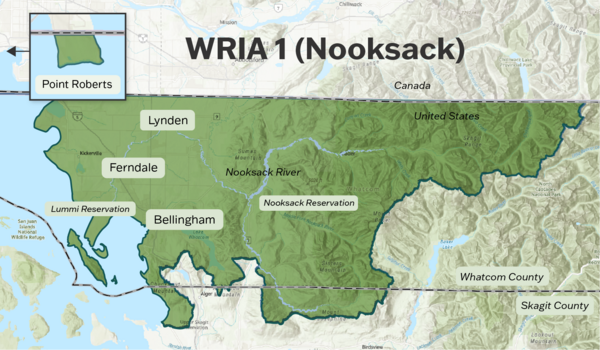Legal process will review and prioritize all water use in the Nooksack basin The Washington…
Remembering Virgil Seymour – Sinixt Leader
Remembering Virgil Seymour – Sinixt Leader
(1958-2016)
– by John Osborn MD
“We may have got pushed out of Canada. We may have got pushed out of Kelly Hill. We may have got pushed out of lower Inchelium. But we’re still by the River. We still stay by the River. Inchelium is right next to the River.
“Learning. Connecting. Understanding. Education. Outreach — are going to be the keys to connecting us back to the places and our people’s bones.
“People ask, ‘What do you want?’ I would like to be able to take care of our sacred places, our ancestors’ bones, and to have consultation for the resources that come out of there.”
Virgil Seymour, words from “One River, Ethics Matter” Gonzaga University, May 2014)
On the summer solstice in Inchelium, 500 people from both sides of the international border gathered to say goodbye to Virgil Seymour. Before leukemia took Virgil, in his short time as Arrow Lakes Facilitator, he did what he set out to do: “Learning. Connecting. Understanding. Education. Outreach.”
Virgil was a Sinixt member of the Colville Confederated Tribes. While serving three, two-year terms as a tribal councilman for the district of Inchelium he was chairman of the Natural Resources Committee. As an elected official Virgil focused on all issues related to the Columbia River, including the Columbia River Treaty, legacy pollution cleanup of the Columbia River and the litigation against mining giant, Teck Cominco. Virgil was a passionate advocate for Sinixt issues and their fate in Canada.
As the Arrow Lakes Facilitator, Virgil worked with tribes, First Nations, and nonindigenous people who all shared an interest in the future of the Columbia River. He was a “true diplomat” for the Sinixt People and, more broadly, for the Columbia River and salmon.
In March 215, Virgil and I traveled together for two days to Kelowna B.C. to meet with Anglican Archbishop John Privett and Roman Catholic Bishop John Corriveau about a “One River, Ethics Matter” conference in British Columbia. During those two days, Virgil shared the stories of his boyhood on the Reservation, teenage border crossings, Kelly Hill, and history of the Sinixt Nation.
Even from Virgil’s bed at Holy Family Hospital in Spokane, struggling with induction chemotherapy and fevers, he was still focused on his work as Arrow Lakes Facilitator. At one point Virgil handed his phone to connect me with people in Revelstoke.
 From his hospital bed, Virgil talked repeatedly about the dugout canoes being launched that would converge at Kettle Falls, calling attention to the need to restore salmon. Virgil had so hoped to be a paddler in the Sinixt canoe, and just beamed when he talked about the canoes. While Virgil was able to return home to Inchelium “right next to the River,” he did not live to see the historic tribal gathering just upstream at Kettle Falls. Four days after his death, the Sinixt canoe — with Virgil’s hand carved into it – converged with canoes from the five tribes of the Upper Columbia to celebrate hope of salmon’s return. On that day, tribal leaders noted that Virgil, too, was there.
From his hospital bed, Virgil talked repeatedly about the dugout canoes being launched that would converge at Kettle Falls, calling attention to the need to restore salmon. Virgil had so hoped to be a paddler in the Sinixt canoe, and just beamed when he talked about the canoes. While Virgil was able to return home to Inchelium “right next to the River,” he did not live to see the historic tribal gathering just upstream at Kettle Falls. Four days after his death, the Sinixt canoe — with Virgil’s hand carved into it – converged with canoes from the five tribes of the Upper Columbia to celebrate hope of salmon’s return. On that day, tribal leaders noted that Virgil, too, was there.
There are two messages that Virgil Seymour wanted us all to hear:
- First Nations, tribes, and nonindigenous people need to put aside their differences and work together to restore the Columbia River and return salmon to waters now blocked by dams; and
- the bones of the Sinixt ancestors exposed by the rise and fall of reservoir levels need to be protected, and the looting of Sinixt artifacts and sacred sites must stop.
Virgil was only 58 year old. He lives on through his family and those whose lives he touched — in both Canada and the United States, and especially from Inchelium, through Kettle Falls and Arrow Lakes, to Revelstoke: “Connecting.”
Virgil’s work carries on through the international effort to modernize the Columbia River Treaty based on the ethical principles of stewardship and justice.
For more:
Virgil Seymour: The passing of a true diplomat. Laura Stovel, The Revelstoke Current



